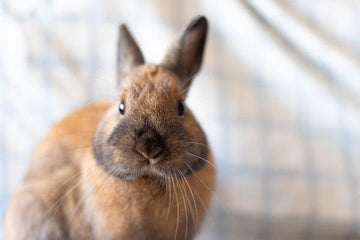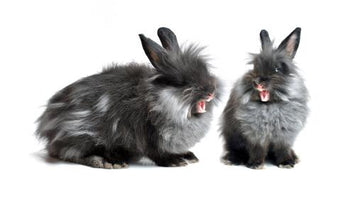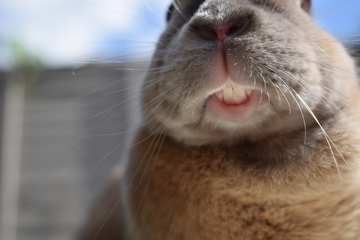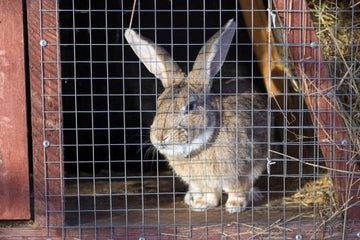Safe Foods for Rabbits: What's on the Menu?
Rabbits make wonderful companions, but their dietary needs can sometimes be tricky to navigate. While these adorable creatures thrive on specific foods, others can lead to serious health problems. If you're a rabbit owner, understanding the safest foods to include in their diet is essential to keeping them happy and healthy.
Click Here to Check Out Our Eating Guide.

In this guide, we'll take a closer look at the foundation of a rabbit's diet, identify safe foods for rabbits, and explore what should be avoided at all costs. Following these tips ensures your furry friend gets everything they need to live a long and active life.
The Foundation of a Rabbit's Diet
A rabbit's diet should be simple, natural, and closely aligned with what they would eat in the wild. For starters, high-quality hay is the most important component of their daily food intake. Hay not only supports a rabbit's digestive health but also prevents dental problems by keeping their continuously growing teeth worn down. A consistent supply of timothy hay, orchard grass, or meadow hay is ideal.
Fresh water is equally vital. Rabbits drink more than you might think, so always ensure they have access to clean, fresh water in a sturdy bowl or bottle. Pellets can also be offered in moderation, but not all pellets are created equal—choose ones that are high in fiber and free of artificial additives.
While hay and water form the base of a rabbit's diet, fresh vegetables, greens, and occasional treats help round out their nutritional needs. These additions keep mealtime interesting and provide essential vitamins and minerals.
Safe Foods for Rabbits
When it comes to safe foods for rabbits, variety is key—but it's crucial to know which foods are appropriate. Here's a breakdown of safe vegetables, fruits, and treats your bunny will love:

Leafy Greens
Leafy greens should make up a significant portion of your rabbit's fresh food intake. These greens are high in nutrients and low in calories, making them a perfect addition to their daily diet. Be sure to wash them thoroughly before serving.
Kale: This nutrient-rich green is safe in small amounts. Its high calcium content means it should be offered sparingly to prevent bladder issues.
Romaine lettuce: A crunchy, hydrating choice that is safe for regular feeding. Avoid iceberg lettuce, as it lacks nutritional value.
Spinach: Packed with vitamins, but like kale, it should be fed occasionally due to its oxalate content.
Cilantro and parsley: Flavorful herbs that bunnies tend to adore. These can be added to their diet a few times a week.
Fruits
Fruits are a great way to add variety and a little sweetness to your rabbit's diet, but they should always be offered in moderation. Too much fruit can lead to digestive upset or weight gain due to their natural sugar content.
Apples (seedless): A safe and crunchy option that rabbits often enjoy.
Bananas: A small slice of banana is fine as an occasional treat.
Blueberries: These tiny fruits are full of antioxidants and are a rabbit-approved snack.
Watermelon (no seeds or rind): A refreshing summer treat that rabbits love in small quantities.
Rabbit-Safe Treats
When it comes to commercial treats, it's important to choose options specifically formulated for rabbits. Many store-bought snacks contain unhealthy ingredients, so always read the label carefully. Better yet, consider offering homemade treats. Simple recipes using oat hay or dried herbs can be a healthier alternative to sugary snacks.

Foods to Avoid
While it's important to focus on what rabbits can eat, knowing what to avoid is just as crucial. Certain foods can be harmful, or even toxic, to rabbits. Always steer clear of these items:
Dangerous Vegetables
Some vegetables that are safe for humans aren't suitable for rabbits. Here are a few common ones to avoid:
Potatoes: High in starch, which rabbits can't digest properly.
Tomatoes: While the fruit itself isn't toxic, the stems and leaves can be harmful.
Onions and garlic: Both are toxic to rabbits and can cause serious gastrointestinal problems.
Fruits and Treats to Avoid
It's also critical to avoid these fruits and snacks:
Avocado: Highly toxic and can cause serious health problems.
Raisins: These can cause kidney damage in some pets, including rabbits.
Chocolate: A well-known toxin for pets that's equally dangerous for rabbits.
Other Unsafe Foods
Finally, some everyday human foods can be surprisingly harmful to rabbits:
Dairy products: Rabbits are lactose intolerant and should never consume milk, cheese, or yogurt.
Bread: High in carbohydrates, which can upset their digestive balance.
Meat: As strict herbivores, rabbits can't process animal products.
Tips for Introducing New Foods
Rabbits have sensitive digestive systems, so introducing new foods must be done gradually. Offer small amounts of a new vegetable or fruit and monitor your rabbit for any behavior or stool consistency changes. You can slowly increase the portion size if they handle the new food well. However, discontinue the food immediately if you notice any issues like diarrhea or loss of appetite.
How to Create a Balanced Diet
A balanced diet is the key to preventing common health problems in rabbits, including obesity, digestive issues, and dental disease. High-quality hay should make up at least 75% of their diet, with leafy greens, pellets, and occasional treats rounding out the rest. By keeping their food natural and safe, you'll help your rabbit thrive for years to come.
Final Thoughts on Safe Foods for Rabbits
Providing safe foods for rabbits is an essential part of responsible pet ownership. From nutrient-packed greens to sweet fruit treats, the options for a healthy rabbit diet are plentiful as long as you know what to avoid. Be sure to prioritize high-quality hay, fresh water, and a variety of fresh vegetables while steering clear of harmful foods.
If you're curious about more ways to check on safe foods for your rabbits, check out this detailed eating guide that we continuously update for quick and accurate information. Or, for a deeper dive into rabbit-safe greens, visit this helpful resource from the RSPCA. Your rabbit's health starts with the right diet—and with the right knowledge, you can ensure they're living their best life.

Signs of Rabbit Health: What You Should Know

Decoding Bunny Behavior: Understanding Rabbit Mood

Rabbit Grinding Teeth: What It Means







